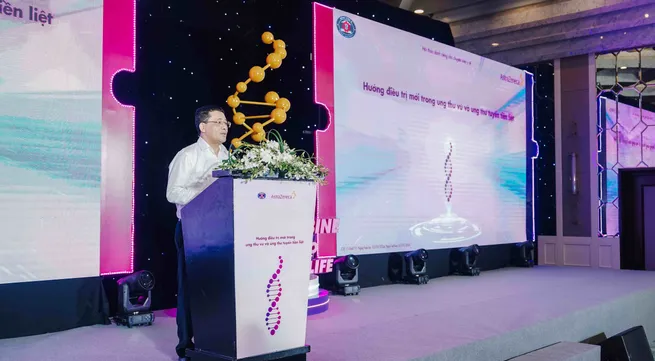Targeted therapy is transforming breast and prostate cancer treatment

Recently, in Hanoi, the Cancer Prevention Research Institute and Vietnam National Cancer Hospital, in collaboration with AstraZeneca Vietnam Co., Ltd., organized a scientific conference titled "New Treatment Directions in Breast Cancer and Prostate Cancer."
In Vietnam, breast cancer is the most common cancer in women, with more than 24,000 new patients and more than 10,000 deaths annually (according to Globocan 2022)¹. Data show that nearly 70% of cases are diagnosed in the early stages.
However, 20-30% of patients will progress or metastasise, especially in high-risk patient groups with clinical characteristics such as young age, large tumour, positive lymph nodes, high histological grade, and BRCA1/2 gene mutation. Among these, BRCA1/2 gene mutation is associated with specific clinical features, a worse clinical course, and poor treatment outcomes. Therefore, treatment needs to be individualised to improve overall patient survival.

Professor, PhD. Le Van Quang, Director of Vietnam National Cancer Hospital gave the opening speech at the conference
For men, prostate cancer is the 5th most common cancer in Vietnam, with more than 5,800 new patients and 2,800 deaths annually1. Metastatic castration-resistant prostate cancer (mCRPC) is a disease with a poor, heterogeneous prognosis and often leads to death.
The workshop updated the latest clinical data showing the role of PARP inhibitors in 2 patient groups: early-stage breast cancer, HER2 negative, with hereditary BRCA1/2 mutations and breast cancer. Metastatic castration-resistant prostate cancer has no indication for chemotherapy.
Emphasising the importance of of BRCA1/2 gene mutation testing in early stage breast cancer patients group, Associate Professor, PhD. Phung Thi Huyen, Head of Internal Medinicine Department 6, K Hospital said "Testing for BRCA 1/2 gene mutations is an important step to help surgeons and internists have a comprehensive patient management plan, including decision-making. Determine the type of surgery and medical treatment. For patients with early-stage, high-risk breast cancer who have inherited BRCA1/2 gene mutations, are HER2-negative, and have been treated with neoadjuvant or adjuvant chemotherapy, PARP inhibitors are an approved treatment option in Vietnam and are recommended by reputable associations”. Data from the OlympiA study showed that this high-risk patient group using Olaparib significantly prolonged overall survival and nearly 90% of patients were alive at 4 years of treatment. To date, OlympiA is the only study with clinical data showing a statistically significant survival improvement in patients with HER2-negative early breast cancer.
The combination of new-generation endocrine therapy and PARP inhibitors from the first step in patients with castration-resistant prostate cancer has been demonstrated through clinical studies, including the PROpel study. The results showed that the group of patients using this combination had a progression-free survival time of up to more than 2 years, an increase of more than 8 months compared to the comparison group, and the overall survival time of the combination arm was over 42 months.
This effect was consistent across different subgroups: based on HRR mutation status, metastasis status, symptoms, or prior chemotherapy treatment. Adverse events were all manageable and similar to the side effects of each drug, such as anemia, fatigue, nausea, or high blood pressure.





